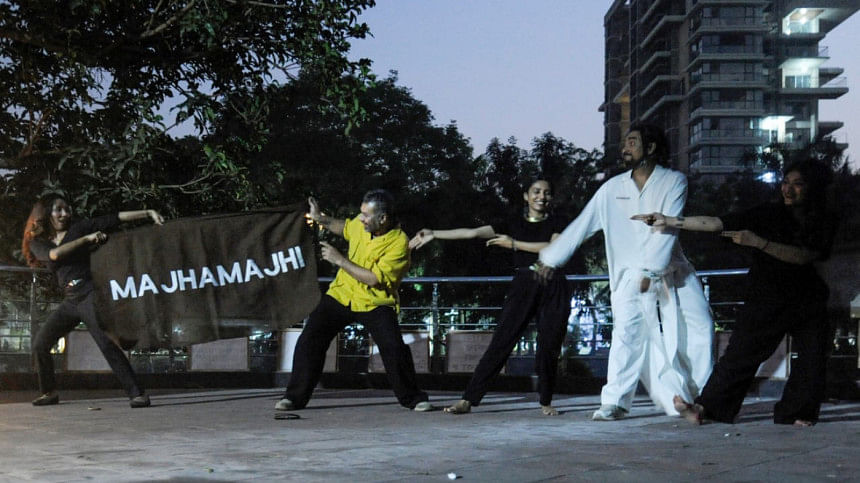MajhaMajhi’s performance art exploring wellness and the concept of shadow work

Dhaka Flow recently hosted a wellness festival, showcasing how mediums like art therapy and dance can be used as tools for wellness. Among its highlights was MajhaMajhi's groundbreaking performance art exploring Carl Jung's concept of shadow work. Through a seamless blend of psychology and art, MajhaMajhi brought to life a vital yet overlooked wellness element – understanding ourselves.
What is shadow work, and why does it matter?
Swiss psychiatrist Carl Jung's shadow work invites us to acknowledge and understand the darker, hidden parts of ourselves – the aspects we often deny or suppress. For example, have you ever said or done something impulsive or hurtful, only to then regret it later? However, the damage is done, and the person at the receiving end of it is upset. You probably felt a rush of shame or guilt after the altercation. You might have wondered why you even said such a thing.
It is precisely this process of self-reflection which points to a blind spot – a part of you that you might not be fully aware of. Even if your reaction seemed justified or made sense at the time, the lack of control you experienced reveals a side of you that's different from the person you think you are.
If you're beginning to uncover this hidden side of yourself, congratulations – you've just encountered your shadow self. When we learn to embrace our own shadows, we gain the empathy to accept others. This inner work is key to healing relationships and creating a more compassionate society.
Early childhood and generational trauma
How many of us really pause to reflect on how learned behaviour and generational trauma shape our thinking patterns? MajhaMajhi explored this through performance art, humour, and storytelling, using audience interaction to ask confronting questions such as: Why do we criticise others? Is it an attempt to fix them, or a reflection of our own unresolved wounds? Why do we self-sabotage wellness plans, even with simple guidelines like eating well, sleeping enough, and balancing work with rest?
Many of our behaviors stem from patterns learned during early childhood which we often carry into adulthood. MajhaMajhi uses its platform to highlight the importance of early childhood development in shaping a healthy society. Breaking cycles of generational trauma begins with self-awareness, and it's here that MajhaMajhi's work shines.

"Healing isn't about fixing others; it's about accepting the parts of ourselves we've been taught to reject," said one of the performers during the show,
MajhaMajhi's art performance at Dhaka Flow wasn't just for entertainment. It was a call to action – a chance to confront our shadows and embark on a journey of self-empowerment.
Healing beyond traditional counselling
In Bangladesh, the availability of mental health professionals is critically low. According to a 2020 report by the World Health Organization (WHO), there are approximately 565 psychologists in the country, equating to about 0.34 per 100,000 population. This translates to roughly one psychologist for every 294,000 individuals. Additionally, there are about 270 psychiatrists, or 0.16 per 100,000 population, which is approximately one psychiatrist for every 625,000 people.
Accessing quality counselling requires time, money, and a significant commitment. In circumstances where individuals are unable to access counselling entirely or to the extent that they need, it is imperative that individuals take ownership of their journey.
MajhaMajhi highlights that in addition to counselling, mindfulness and other evidence-based self-awareness practices can help individuals heal and grow. By combining entertainment with meaningful self-exploration, MajhaMajhi makes these practices both accessible and impactful.
A movement for change
By blending psychology with performance art, MajhaMajhi presents complex concepts in an engaging, relatable way. It challenges societal norms, promotes self-awareness, and fosters healing within communities.
The #RevolutionWithin by MajhaMajhi urges us to silence the noise of the outside world and uncover the power that lies within. The question now is: Are you ready to take the first step? Are you ready to confront your shadow, question your conditioned behaviours, and embrace the journey of self-acceptance?

 For all latest news, follow The Daily Star's Google News channel.
For all latest news, follow The Daily Star's Google News channel. 



Comments